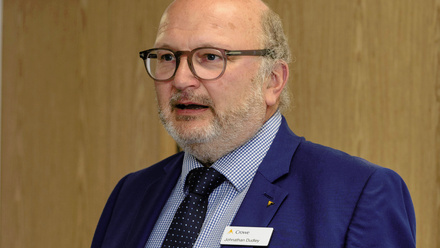The need for strategic collaboration and innovation for regional economic growth

Nigel Driffield (pictured), Professor of international business and deputy pro vice chancellor for regional engagement at Warwick Business School is an advisor for the Business Commission West Midlands (BCWM).
He has been supporting with engagement in the region’s business community and the creation of the final ‘Roadmap for Business Growth’ report.
Nigel Driffield’s main research interests are economics of international business with a focus on the nexus between firm strategy, such as location decisions, and local responses seeking to influence this in both the home and the host country. He is on several editorial review boards and also works with a number of local and national stakeholders on issues relating to inward investment and economic development.
Nigel reflects on his role in the commission and the next steps for business growth in the Midlands in this blog.
The BCWM report is particularly timely, with a new mayor and potentially some new economic priorities for the region.
While mayoral powers are limited, one area in which a mayor can make a real difference to the regional economy, is through prioritisation, and fostering collaboration between different stakeholders. This report provides an excellent basis for such a process.
There are many things to commend this report, but holistically perhaps the main one is that it recognises the joint agenda between business and policy that represents the path for growth.
Too often such reports set one side against the other, with the private sector demanding “tax cuts” or policy makers designing grand strategies that leaves business wondering how it will be paid for.
This report recognises the challenges for business, in generating growth and productivity, and the role of public policy in facilitating this.
The report pulls no punches in setting out the challenges for the region, in terms of exports, innovation and investment. Many of these are linked.
One challenge for example that the region faces is the number of high skill jobs that are carbon intensive, or linked to technology that will soon be phased out, such as the internal combustion engine.
The challenge that we all face is how we can help individuals, and businesses pivot into new greener activities. This will take investment.
As the report highlights too many firms have been hesitating to invest due to various headwinds and uncertainties, while smaller firms have seen margins squeezed by inflation, and thus have less to invest.
Similarly, the volume of FDI globally has declined, and while our region continues to perform well and attracts more than its fair share, especially in certain key sectors, we are fishing in a diminishing pond.
Innovation, and the financing of innovation are the only solutions to the regions plight, but innovation cannot happen in a vacuum, it needs skills to both develop the technology, but also crucially to use it.
The skills need of the region are clear, and can be summed up by three interwoven problems.
The region has performed well in terms of the use of its devolved funding for skills and has made significant progress in addressing the skills challenge.
However, the emphasis (and funding) has been on lower level skills.
The emphasis now needs to be on the creation of, and retention of higher-level skills. The requires (from government) or much more imaginative and flexible use of the apprenticeship levy, but even greater collaboration between business and (further and higher) education.
Where we do this – in advanced manufacturing for example, we do this very well, but this has historically been supported by EU programmes, with nothing at present to take their place.
Secondly, in common with other regions of the UK, our travel to work areas is too small, leading to large sections of our region unable to access employment opportunities that are only a short distance away.
In a report for the Productivity institute, we highlight the extent of regional inequality that exists over relatively short distances.
This leads to employment mismatches and skill shortages in the aggregate.
Collectively therefore the report highlights the need for greater emphasis on skills, innovation and investment. Initiatives such as the investment zone and the innovation accelerator are a start, but they need to be seen as mechanisms for crowding in more investment, not an end in themselves, requiring a clear strategy focussed on a small number of initiatives that have the capacity to foster growth across the region.



